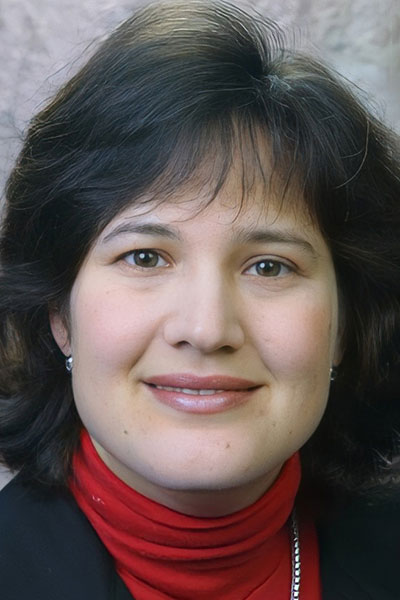As an advocate for the rights of people with disabilities during the last half of the 20th century, Margaret Pfrommer was on the forefront of discussions about autonomy and self-determination. Decades later, her legacy is defined not only by the changes she helped inspire but also the patients and physicians who continue that work today.
Those advocates and the importance of increasing equity for people with advanced respiratory failure were the focus of the Margaret Pfrommer Endowed Memorial Lecture in Home-Based Mechanical Ventilation, Breathing Is a Human Right: Equity for Ventilatory Disability, on Wednesday, October 19, at CHEST 2022.

Lisa F. Wolfe, MD, FCCP, a professor of medicine and neurology at the Northwestern University Feinberg School of Medicine, delivered the lecture, which was established in 1999 by Allen I. Goldberg, MD, MBA, Master FCCP, and Eveline A. M. Faure, MD, to honor the memory of Pfrommer, who became a patient advocate after contracting bulbar polio in 1956.
Dr. Wolfe began by outlining some of the milestones for people with disabilities that occurred during Pfrommer’s lifetime—and also in her vicinity—including the establishment of the Rehabilitation Institute of Chicago (RIC), the first freestanding rehabilitation hospital, which is now the Shirley Ryan AbilityLab at Northwestern. She also told the story of Dr. Henry Betts, medical director at the RIC, who advocated for the rights of people with disabilities in Chicago in the 1960s and beyond and, later, more widely for the Americans with Disabilities Act (ADA).
Dr. Betts—like many others—was inspired by his introduction to Pfrommer, whose mobility was profoundly affected by polio. Pfrommer was forced to live in a nursing home for a time, but friends found her housing on the Northwestern campus, where nearby students could come and care for her.
Dr. Betts helped her get a job in the department of prosthetics and orthotics and, eventually, helped connect her to politicians and celebrities who could help influence national and international policy. In the subsequent decades, Pfrommer helped achieve progress related to issues of ventilation, feeding, sip-and-puff-powered wheelchairs, Social Security, and more.
“The first obligation from the Hippocratic Oath is to preserve your patient’s autonomy. You need to be their voice when they don’t have a voice. But Margaret would say, ‘I do have a voice, and what you are obligated [to do] as a physician is to preserve my voice,’” Dr. Wolfe said.
Dr. Wolfe closed out her lecture by highlighting other patient advocates whose voices have made a difference for people with disabilities.
The first was Carol Gill, Professor Emerita at the University of Illinois Chicago. Gill, who was also a polio survivor, wrote a well-known paper that called for a new paradigm in how disability was perceived.
“When we acknowledge that someone has a physical or mental impairment, it is not a disability; it is just one of the many things that is on the long list of how each of us is different from each other,” Dr. Wolfe explained. “We all have issues of diversity. When you are in a wheelchair or use a sip ventilator, like Carol does, that is part of your diversity; it’s not part of your disease. Carol isn’t her disease. She’s a champion.”
Dr. Wolfe also highlighted Katie Beckett, a child living in Iowa who could not be released from the PICU because there was no way—at the time—to treat a child with a mechanical ventilator at home. Many states now have a Katie Beckett Medicaid waiver that allows certain children younger than age 19 who have long-term disabilities or complex medical needs to become eligible for Medicaid coverage and receive care in a home setting rather than an institution.
Sydney Peterson was diagnosed with congenital central hypoventilation syndrome and needed a ventilator to help her breathe. Her family and others filed a class action lawsuit to change how an Illinois program funded in-home nursing care because the cost of care was prohibitively expensive beyond the income level cutoff for the program. Sydney’s public testimony made a big difference, Dr. Wolfe said.
Corey H. was a young boy with a disability who filed a class action lawsuit against Chicago public schools that did not allow him to attend because they lacked the resources. The lawsuit helped get kids with tracheostomy tubes and ventilators back in schools, Dr. Wolfe said, and it was supported by the part of the ADA that Pfrommer advocated for, called the Least Restrictive Environment rules.
Dr. Wolfe highlighted several other individuals’ stories as well, touching on the topics of ongoing financial aid into adulthood, as well as sexuality and sexual surrogates. She closed with an anecdote about the late actor and advocate Christopher Reeves, his support to the RIC, and how he was a proponent of research.
“He said, ‘Look, I don’t get anything about being public about this. It’s probably easier for me to be private. But the world gets more out of me supporting research than just fading away.’ And I think that’s a wonderful lesson,” Dr. Wolfe said.
The Margaret Pfrommer Endowed Memorial Lecture in Home-Based Mechanical Ventilation is generously supported by International Ventilator Users Network of Post-Polio Health International and the CHEST Foundation.
Join us at CHEST 2024
Connect in person with influential clinicians from around the world—and attend top-tier educational sessions focusing on the most relevant clinical topics. CHEST 2024 will have it all, including optional add-on sessions to customize your learning. Reserve your spot today, and save $100 when you register by September 22.





